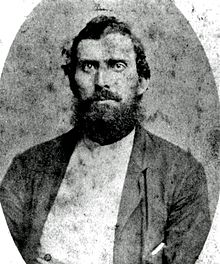 Last summer a new movie came out which I was interested in seeing. Unfortunately it didn’t last long enough for me to see it, but I did pick up a copy of the book on which the movie was based. “The State of Jones” by Sally Jenkins and John Stauffer tells the story of Newton Knight and Jones County, Mississippi during the Civil War. The people of Jones County were, for the most part, hardscrabble yeoman farmers who did not own slaves and were supportive of the Union. In fact, the people of Jones County voted not to secede. The book tells the story of the people of the county, seen through the life of Newton Knight.
Last summer a new movie came out which I was interested in seeing. Unfortunately it didn’t last long enough for me to see it, but I did pick up a copy of the book on which the movie was based. “The State of Jones” by Sally Jenkins and John Stauffer tells the story of Newton Knight and Jones County, Mississippi during the Civil War. The people of Jones County were, for the most part, hardscrabble yeoman farmers who did not own slaves and were supportive of the Union. In fact, the people of Jones County voted not to secede. The book tells the story of the people of the county, seen through the life of Newton Knight.
Knight was one of the yeoman farmers conscripted into the Confederate army. After fighting at Corinth, he left his unit to go back home to support his wife and children. But he was caught, disciplined, and sent back to the army. The second time he was in the battle of Vicksburg, where he endured the siege and almost died. When the Confederate soldiers were paroled, Knight returned home to Jones County determined not to fight anymore for the Confederacy.

Newton Knight and a group of runaway slaves and Confederate deserters made their home in the swamps of Jones County. Eventually they wielded enough power that the Confederate forces stopped coming into the county. The residents of Jones County said that they lived in “The Free State of Jones” and were loyal to the Union. They did everything possible to confound the Confederacy. When General Sherman marched through on his way into Georgia, he gave orders to Captain Knight and his men.
But, after the war, the Union deserted men like Knight who were faithful during the war. Although Reconstruction was a hopeful start for the Union loyalists and the freed slaves, power was soon given back to the southern aristocrats who had supported the Confederacy. Despite repeated calls for help, the Federal government refused to intervene and Knight and his men were hanged, shot, beaten, or run out of the county. Newton Knight responded by retreating deeper into the swamps and living on a guarded compound with his white wife, Serena, his black “wife,” Rachel, and their children.
“The State of Jones” tells this unlikely story in a thoughtful, well-researched style. The story is a difficult one of fighting against oppression in many different forms. Although Newton Knight treated his white and mixed-race children equally, the people around them in Mississippi did not. Because of their separation in the swamp, Knight’s great-grandchildren were not sure if they were of mixed race or white. Newton’s great-great-great-grandson was put on trial for marrying a white woman. In a trial in 1950, he was found to be 1/8 black, which made him black according to Mississippi’s laws, and was sentenced to five years in prison. Fortunately the Mississippi Supreme Court overturned his conviction, instead of risking the Federal government coming in and saying that the law of miscegenation was unconstitutional.
It took me a while to read this book because I get so angry at the racist laws and behavior that I had to quit reading in order to calm down. I hate injustice of any form and this book details plenty of it. The black people were disenfranchised as soon as the former Confederates regained power. In fact, any black person who tried to vote in Mississippi was routinely beaten and many were killed. Organizing by the blacks to discuss peaceful action was also a call to arms for the KKK. Desegregation is still a problem in Mississippi as shown by the court order to desegregate schools in Cleveland, Mississippi in 2016.
Although we are 150 years past the Civil War, the problems of racism are still very real in our country. It is easy for white people to close their eyes to the problem and say that we have overcome it. “The State of Jones” is a warning for all of us not to become complacent but to constantly guard against the discrimination, racism, and bigotry that are barely suppressed in our lives and in our country.
